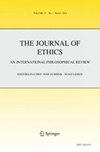自己造成的法兰克福式案件和自由的闪烁
IF 0.8
Q3 ETHICS
引用次数: 0
摘要
根据闪变辩护最流行的版本,法兰克福案例不能破坏备选可能性原则(PAP),因为在这些案例中,行为人(直接)对自己做出的决定不承担道德责任,而是对自己做出的决定负责,而这些决定是他们本可以避免的。法兰克福辩护者主要集中在试图表明,不自行做出相关决定的另一种可能性并不是一种强有力的选择,同时普遍承认,这种选择不能轻易从这类成功案例中消除。在最近一期的本刊中,Stockdale(2022)试图回避关于稳健性的争论,并提出了一种新颖的法兰克福式案例,在这种案例中,代理人无法避免自己做出相关决策。斯托克代尔论证的根本问题在于,它建立在一个不可信的独立行动概念之上。我帮助澄清了在这种情况下自己做一件事的相关意义,并表明这些新病例无法克服PAP的闪烁防御的目标版本。本文章由计算机程序翻译,如有差异,请以英文原文为准。
Self-Inflicted Frankfurt-Style Cases and Flickers of Freedom
Abstract According to the most popular versions of the flicker defense, Frankfurt-style cases fail to undermine the Principle of Alternative Possibilities (PAP) because agents in these cases are (directly) morally responsible not for making the decisions they make but for making these decisions on their own , which is something they could have avoided doing. Frankfurt defenders have primarily focused on trying to show that the alternative possibility of refraining from making the relevant decisions on their own is not a robust alternative, while generally granting that this alternative cannot easily be eliminated from successful cases of this sort. In a recent issue of this journal, Stockdale (2022) attempts to sidestep the debate concerning robustness and develops a novel kind of Frankfurt-style case in which agents are unable to avoid making the relevant decisions on their own. The fundamental problem with Stockdale’s argument is that it hinges on an implausible conception of acting on one’s own. I help clarify the pertinent sense of what it means to do a thing on one’s own in this context and show that these new cases are unable to overcome the targeted versions of the flicker defense of PAP.
求助全文
通过发布文献求助,成功后即可免费获取论文全文。
去求助
来源期刊

Journal of Ethics
Arts and Humanities-Philosophy
CiteScore
1.50
自引率
0.00%
发文量
21
期刊介绍:
The Journal of Ethics: An International Philosophical Review seeks to publish articles on a wide range of topics in ethics, philosophically construed, including such areas as ethical theory, social, political, and legal philosophy, applied ethics, meta-ethics, the metaphysics of morality, and the history of ethics. The Journal of Ethics publishes work from a wide variety of styles including but not limited to the analytic tradition and hermeneutics. The Journal of Ethics is also interested in ethical thinking that is enriched by psychology, sociology and other empirical disciplines. The Journal of Ethics is primarily an organ of philosophical research, although it publishes work on topics of concern to academics and professionals alike. The journal also seeks to publish the highest quality commentaries on works published in its pages. Its double-blind review process must ensure analytical acuity as well as depth and range of philosophical scholarship.
At the moment, the journal does not publish book reviews.
 求助内容:
求助内容: 应助结果提醒方式:
应助结果提醒方式:


